13 Easy Ways to Cut Back on Your Screen Time

Steve Jobs described technology as a bicycle for your brain — and that sounds pretty healthy. However, as documentaries and studies have shown the negative effects of spending too much time online, people have been wondering how to reduce screen time.
Screen time — and more specifically scroll time — is like the new mindless snacking. And it’s largely motivated by the same impulses that make you reach for unhealthy snacks when you’re feeling bored or stressed.
When your smartphone demands too much of your attention, putting a limit on screen time is a good way to start taking back control. “It’s important to be mindful and find a balance,” says founder and director of Digital Citizen Academy Dr. Lisa Strohman, Ph.D.
Learn when it’s time get your scrolling habit in check and how to unglue your eyes from the screen.
How Much Screen Time Is Too Much?
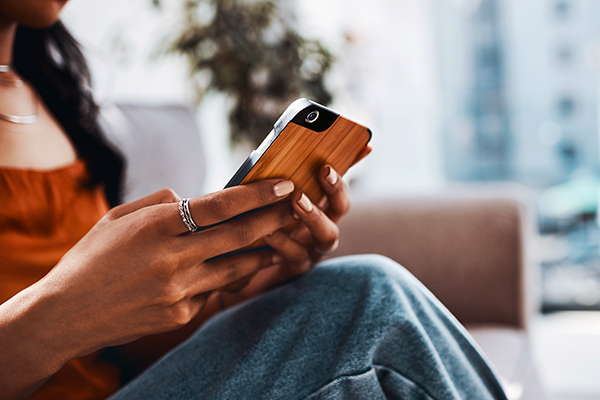
Anything more than two hours of non-utility use is concerning, Strohman explains. “It doesn’t have to be consecutive. It can be sporadic usage. The way we toggle in and out of social media throughout the day still adds up from a mental health or wellness standpoint.”
Studies have found a link between social media, anxiety, and depression, which means there’s a good chance spending hours scrolling through other people’s pics isn’t serving you.
17 Ways to Reduce Screen Time
Here are some easy strategies to outsmart your smartphone and spend less time looking at your screen.
1. Scroll mindfully
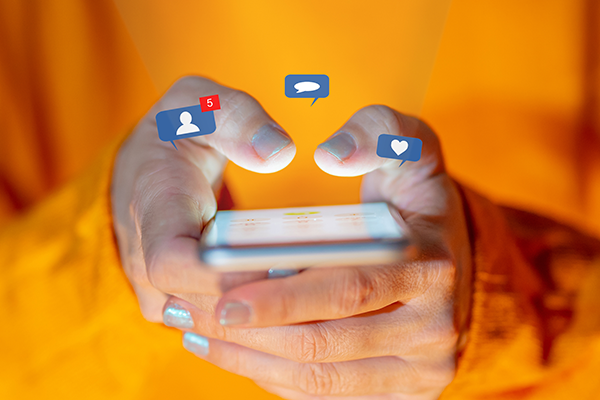
“Start building awareness on how you’re spending your time on devices,” says Amanda Stemen, M.S., LCSW. “Notice what you’re doing and assess whether it’s what you intended to do, if it’s productive, or if it’s contributing to your long-term goals.”
Did you mean to shop for groceries or spend an hour on Instagram? Your smartphone is a tool; you wouldn’t whip out a hammer just because you’re bored.
“Use your phone mindfully and have a purpose,” Strohman says. “Really examine why or how you’re using your phone. It’s very easy to get sidetracked by fancy lights and notifications.”
2. Turn off push notifications
Many apps use the dopamine reward system to keep you hooked, turning us into Pavlovian drones. “You should be seeking out information, not being pushed into a notification,” Strohman says.
You can switch your phone to Do Not Disturb or manage apps individually to minimize pings.
3. Put your phone out of reach
“Keep devices physically away from you if you don’t have an intentional reason to use them,” advises Stemen.
Many of us carry our phones around as if they’re extensions of our arms — all those quick peeks add up.
4. Keep busy

Studies suggest we can probably walk and text if we slow down and are still aware of our surroundings, but not texting and walking by choice is another way to reduce screen time. Looking up and “liking” nature around you is also a thumbs up.
Meal prep is a win-win for reducing screen time and staying on track for healthy eating. It’s hard to scroll when you’re washing and chopping veggies.
Need some fresh ideas on what to make or how to meal plan? We got you.
5. Use a tracker
Not sure how many hours you’re spending on your phone?
Use a screen tracker to count your digital “steps” — and how much time you’ve spent on adorable dog TikToks (we get it, we love them, too — but in moderation).
6. Take a smartphone sabbatical
“Taking an intentional break can be like pushing a reset button for your brain while making more time for being active,” says Billy Roberts, LISW-S.
Spend a weekend — or even a few hours — off your phone to see how you feel without it.
7. Cap text convos

Thanks to smartphones and text messaging, keeping in contact with friends has never been more convenient. But this convenience comes at a cost: constantly picking up your phone and clicking away. Instead, try a phone or video call or an IRL meet-up to run errands or go for a walk.
8. Do a purge
“Delete apps you don’t use,” Strohman says. For example, if you’re using Zoom on your computer, you probably don’t need it on your phone as well. A digital declutter could also save you money on data.
9. Make your display less attractive
When it comes to being hypnotized by shiny objects, we’re fundamentally no different than babies. The color filters on your phone may help: “Mindless scrolling is less intriguing when it’s not in color,” says Dana C. Avey, M.S., M.A., LMFT, BC-TMH, ADS.
10. Put your phone away at meals

Mindless scrolling and mindless eating are a bad combo, or worse, ignoring your partner or family members to check text messages instead of sharing a meal.
“Break the pattern of screen time on autopilot,” says Roberts. Make an effort to be present in the moment and engage with the people who are right in front of you instead of the ones in your phone.
11. Turn on a nighttime setting
Night mode settings on screens tone down the blue light, which keeps us alert and can mess with sleep patterns.
Like grayscale, it also makes your phone screen less exciting to look at.
12. Buy a cheap alarm clock
If the first thing you reach for in the morning is your phone, then it’s setting the tone for your day, whether it’s an upsetting headline or a stressful work email, Strohman advises. Using an alarm clock can help create a habit of being screen-free in your bedroom.
13. Turn off location services
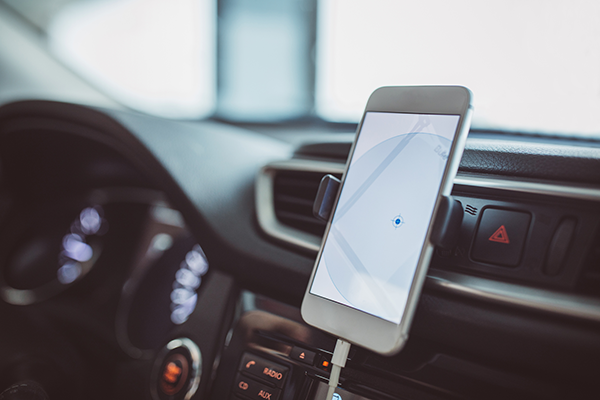
Eventually, smartphones will threaten to hurl themselves off the nearest bridge if you don’t pay attention to them. (We’re only half-joking.) But getting notifications on places you typically go, such as how long it will take you to get to work, is just another ploy to open an app. Unsubscribe.
Healthy Screen-Time Swaps
You can do so much more with the powerful tool at your fingertips than “like” cute cat pics (although, no one’s arguing that they’re not adorable). The goal is recasting those mindless spirals into deep, dark rabbit holes with mindful, empowering behavior.
Stream a workout
Lost a half-hour of your life to TikTok? Counter it with a 30-minute cardio class. As a tool, your smartphone enables you to work out on your schedule, anywhere you want. (With BODi, you can join live online workouts in real time — or stream on-demand workouts on your own time.)
Use a meditation app
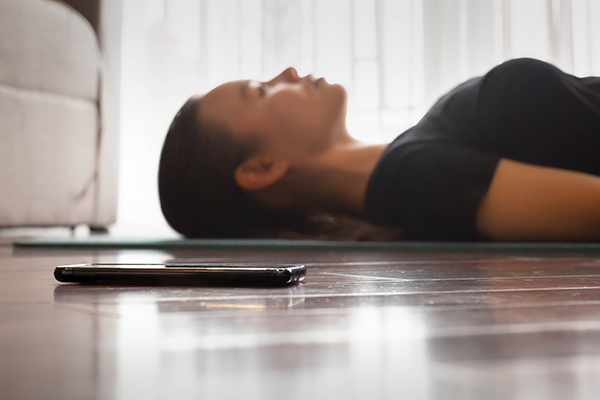
Your phone is great at holding your attention. Now, if you want to turn that into a positive, it can help you develop a mindfulness or meditation practice. “Even in our fast-paced lives, you can use your phone to slow down and take the outside world offline for a few moments to breathe,” Strohman says.
BODi’s Sound Meditation creates a “sound bath” with singing bowls, harps, and chimes to help calm your body and mind and promote an overall sense of well-being.
Discover a different viewpoint
Instead of doomscrolling through negative posts on social media, listening to a podcast or an audio book is an easy way to expand your knowledge.
Set work boundaries
It’s amazing being able to work from anywhere — until you find yourself working from everywhere. A smartphone can enable workaholism, so setting reminders to take a break can help preserve limits.
Even if you think you’re only using your phone for work, check your screen time against your salary and see if those extra hours are worth it, Strohman says.
Get creative
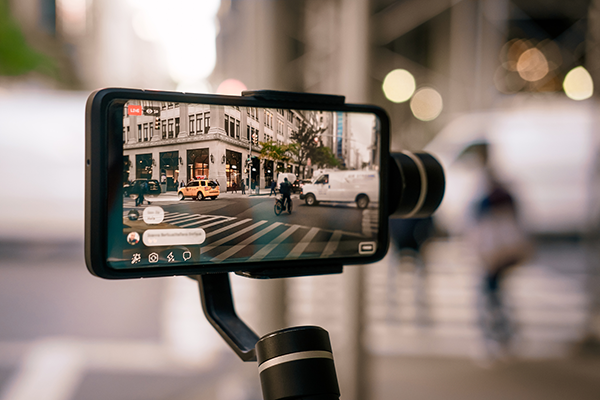
Shooting a short movie and making music with your smartphone might be more fulfilling than nailing the perfect selfie.
Your phone can also connect you to platforms like Master Class, where you can learn from your favorite singers, chefs, and filmmakers.
Learn a foreign language
Google Translate is pretty incredible when you need a quick interpretation, but your smartphone is also a tool for learning a new language.
Popular apps include Duolingo, Babbel, and Rosetta Stone.
Why Are We Hooked on Our Phones?

The tech industry works with behavioral psychologists to develop apps that stimulate dopamine (the same neurotransmitter linked to the reinforcement of drug use) and activate our brain’s reward system. It’s similar to loading up on junk food that’s full of added sugar and salt.
“Our brains are most excited by the anticipation a buzz or notification produces,” Strohman says. “That anticipation is like waking up to a present on Christmas morning and not knowing what’s inside. But when you open it, you see oh, it’s just socks… again.”
